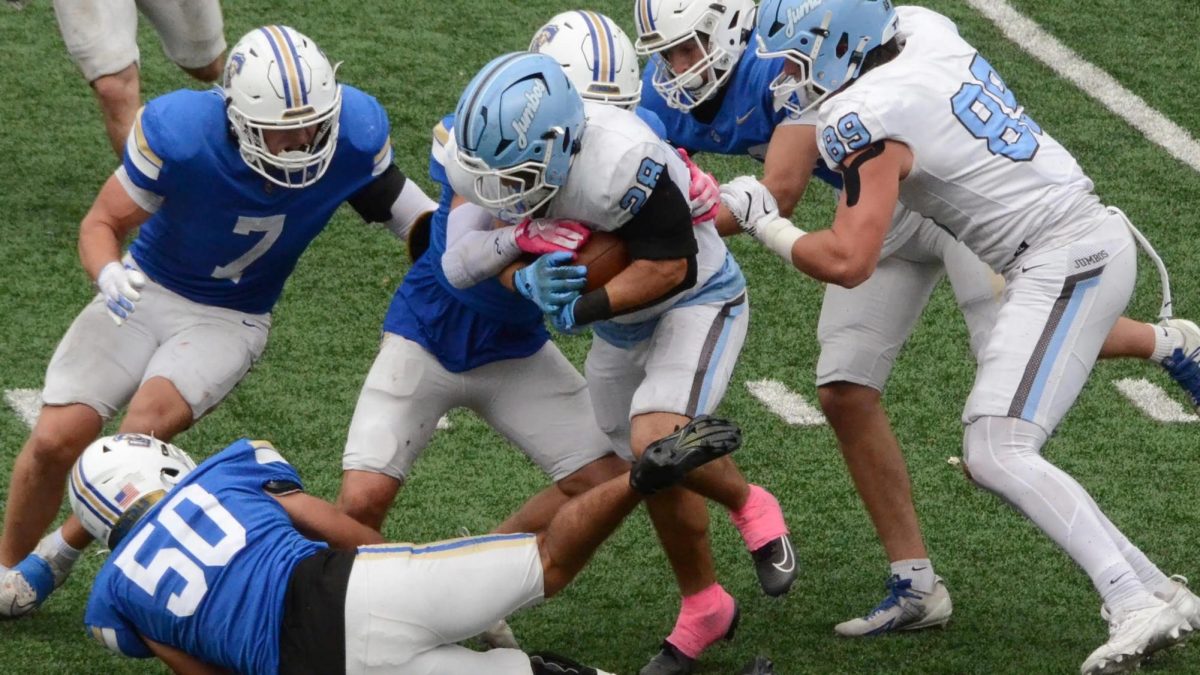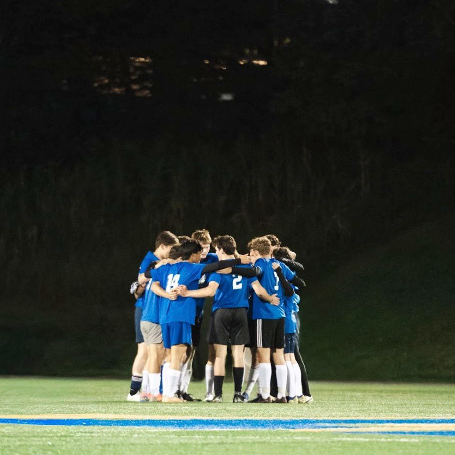The pastel blush of dusk melted into twilight as the floodlights roared to life above Withiam Field. Anticipation had been simmering for days: the first Men’s Club Soccer (affectionately, “Cloccer”) showdown beneath the Friday night lights in living memory was about to unfold. Their foes, SUNY Oneonta, had arrived early, slicing through warmups with military precision while the boys trickled in, no doubt weary from a week of academic exertion. A palpable unease rippled through the team as eyes met the synchronized drills of their opponents; our poor boys, huddled on the sideline, wondered if they’d even have jerseys by the time the whistle blew.
A pervasive haphazardness has never dampened the Cloccer spirit; indeed, it may well be its lifeblood. From this disorder springs a style so unrestrained it borders on the artistic, a Pollock-esque ballet seldom glimpsed amid the highest echelons of the modern game, let alone in the tranquil wilds of upstate New York. Out of the gathering twilight strode Captain Orhan Algar ’26, a knight of not Camelot but Withiam, bearing the long-awaited jerseys. With a voice that thundered across the field, he fashioned from chaos a formation worthy of battle. And egad, what a rally he sparked! Within five minutes, the mercurial Merrick Plummer ’27—winged, it seemed, by the sandals of twinkle-toed Hermes himself—had twice found the back of the net. Each goal was a testament to the clairvoyance of Gregoire Winston ’26 and John Reidy ’26, whose passes sliced through Oneonta’s defense like a blazing blade through buttery blocks of brie.
At the twentieth minute, an act of uncommon magnanimity stirred the souls of all who beheld it. After Algar ’26 was felled within the box, all eyes fell upon Plummer ’27 to deliver justice with his scimitar of a right foot. Yet, in a gesture that will echo through Cloccer lore, Plummer renounced his chance at a hallowed hat trick, bestowing the penalty instead upon Archer Fried-Socarides ’27, who duly stepped forth and struck true. In the preceding minutes, even the specter of triumph could not banish the shivers of the treacherous winter chill, but Plummer’s ’27 virtue left hearts as warm as if seated beside a crackling fire, feet wrapped in the coziest of knitted woolen socks.
Despite the cornucopia of goals, it bears noting that this scintillating offense was founded upon an unshakable supporting cast. The steel and brawn of Fried-Socarides ’27, complemented by the elegance and eloquence of Jun Reiss ’26, forged a center back partnership of fearsome resilience, repelling wave after wave of Oneonta’s assaults. Reiss performed admirably despite a romantic escapade that had cast doubt upon his arrival; yet fortune smiled, and he graced the field in his full majesty. Meanwhile, Jonah Zaas ’28 and Yuxuan Xu ’26 continued to redefine the very essence of the modern full-back, steamrolling up and down the pitch with the inevitability of entropy’s erasure of order.
Their industry culminated in a spectacular goal: Zaas ’28 looping a parabolic cross to the far post, where Xu ’26 met it like a porpoise joyfully vaulting from oceanic depths. In the midfield, Gordon Stone ’27, Finn Norsen ’27 and Asher Zamudio ’28 orchestrated the game’s tempo with the panache of a seasoned conductor at the Vienna Philharmonic. Meanwhile, a cadre of first-years—Justin Nasdor, Oliver Goldin, Walker Naughton and Jacob Berliner – infused the weary upperclassmen with a spark of youthful exuberance, a much-needed antidote to the cruel indignities of the world and the inexorable decay of aging knees.
The match was also marked by the debuts of Philip Wohlfeld ’28 and Uriah Adby Reniran ’26. Wohlfeld’s steady hands ensured a clean sheet in the first half. Adeniran’s entrance, meanwhile, was met with rousing applause, the culmination of three years of tireless work in the Cloccer academy. Every time he touched the ball, the sidelines erupted in cheers, his bone-rattling tackles standing as living proof of the academy’s rigorous training.
From the bench, Erik Duboulay ’27 offered a wry grin. “Two years on, it is just as exhilarating to be riding the bench. There’s nowhere I’d rather be.” And for good reason, as the infectious energy from the sidelines proved just as vital as any play on the field, fueling the team’s high-octane rhythm. The fans, undeterred by the chill, also filled the air with chants and laughter. “The atmosphere was absolutely electric,” said Marcela Rondon ’27, her voice still hoarse from shouting.
As the final whistle blew, the scoreboard glowed 6-2, Plummer ’27 having completed a historic four-goal performance. Handshakes were exchanged, smiles traded and the victors gallivanted into the night, ready for well-deserved festivities. Long after the lights dimmed, the echoes of their triumph lingered, destined to be recounted in reverent tones by those lucky enough to have witnessed it.

























